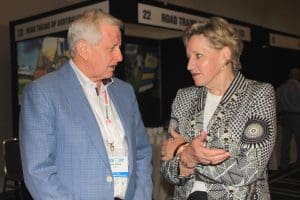
ALEC chairman Simon Crean, left, with WA Minister for Agriculture and F0od Alannah MacTiernan at the 2017 LIVEXchange conference.
PROPOSED changes to live sheep export stocking density rules were inadequate and would fuel demands for a Middle East trade ban, Western Australia’s Minister for Regional Development; Agriculture and Food Alannah MacTiernan said today.
Ms MacTiernan said the government’s response to the McCarthy Review was an improvement, but it is not good enough to address animal welfare issues during the northern summer and restore the industry’s credibility.
“I fear that in the long-term that is going to be to the detriment of WA sheep farmers.”
“We particularly note that the reliance on reduction in stocking densities… the science is telling us is not going to deal with those fundamental problems that we see in the high Middle Eastern summer.”
Ms MacTiernan said the McCarthy recommendation to put a new heat stress model in place by July 1 this year has been ignored. She raised the prospect of further action under state laws and possibly a trade “pause”, with a decision on this by the end of next week.
“Now we’re going to go in and bridge that gap and I really urge the federal minister to reconsider and at the very least, really adopt the recommendation of McCarthy to adopt the new heat stress standards by July 1.”
The WA government is taking legal advice on its obligations under the WA Animal Welfare Act to prevent cruelty on board ships going to the Middle East during the high summer period. She hoped by the end of next week “at the absolute latest” to have a definitive statement on the state government’s obligations “and how we might practically give effect to that.”
“We will act if we have an obligation to act.”
Dr McCarthy recommended that that the risk settings on the current Heat Stress Risk Assessment model in the Australian Standards for the Export of Livestock be adjusted to better reflect community expectations, and be in place for this northern hemisphere summer or by July 1 2018. He recommended modification of the HSRA model to include duration of exposure and the period of time that sheep are exposed to heat without respite. However, Dr McCarthy anticipated the new stocking density and HSRA settings, if implemented, would impose substantial restrictions on many vessels wishing to participate in the trade during the northern hemisphere summer period, depending on the month, their ventilation capabilities, the cargo they intend to carry and the destinations involved.
Mr Littleproud this morning said the heat stress recommendation required further work and consideration to understand its ramifications and impacts.
“It also potentially produces fluctuations in stocking density of between 18 and 79 percent.
“Dr McCarthy has said this needs independent technical review. I want to start that journey immediately,” he said.
Government’s McCarthy response not strategic
However Ms MacTiernan said she was “deeply concerned” that the McCarthy report and the government’s response, in the long run, would not help WA sheep farmers reliant on the live export industry.
“In the long-run this is going to feed the cause and the calls across Australia for a ban on this trade.
“Unfortunately the inadequacies of this response are going to mean that the public call to stop this trade is going to continue,” she said.
“I think that if there had been a decision and an acceptance of the science that it was almost impossible to make this trade safe during those high summer months, I think our farmers would have been in a lot better position in the long-term.”
WA minister flags possibility of Middle East trade “pause”
Ms MacTiernan said the WA government would continue to put pressure on the Federal Government to do more, but under WA Animal Welfare Act 2002 it had an obligation to take preventative action if it believed an act of cruelty is about to occur to an animal.
“It may well be then that we have the obligation if we think that these sheep are being sent into the Middle East at a time and in circumstances that aren’t going to deal with that real heat stress issue that we may have to take action to place a pause during those months.
“We don’t want to be in this situation, we believe that really the federal government should be understanding the real issue and that is the need to restore some real credibility to this industry,” she said.
“In the worst case scenario, we will have to consider how we as a state government might be able to impose some greater limitations to deal with the really highest risk problems.
She said her government was seeking advice on what “additional layers” it can add to the government’s position to deal with the issue of stocking density heat risk with the high temperatures and humidity en route to Qatar from July to September.
WA farmer leaders not thinking strategically
Ms MacTiernan said WA farmer leaders who welcomed the government’s response were not thinking strategically.
“I don’t think they are understanding the level of public disquiet out there about this trade.
She said the government had “gone for” the short-term interests of the exporters, not the long-term interests of WA farmers, and suggested farmers might think they have won the battle, but “might lose the war”.
“I suspect it will be a pyrrhic victory, because it will do nothing to assuage the concern in the public across Australia about this trade.”
Ms MacTiernan said she had been trying to avoid an “under-reaction” to the industry’s public credibility issue leading “almost inevitability to a groundswell of public opinion in an over-reaction.”
“I suspect in a way that what Mr Littleproud and the Turnbull Government more generally has done here today is perhaps set up the circumstances where we may have a 2011 situation.
“I suspect that what you will see now is more and more Liberals in the Federal Government coming on board for this banning of the trade,” she said.
“If anything it is going to lead to the strengthening of those who would close this industry down.”
She believed there is more opportunity of more opportunity for meat processing in WA, but understood the importance of the trade to wool growers.
“If we don’t deal with this very real problem and this specific problem that has presented itself over the Middle Eastern summer, I don’t think we are going to be able to rebuild the public confidence in this industry and credibly see this industry go forward.”
On the new penalties for animal welfare breaches, Ms MacTiernan said it was “not just a question of the penalties” with not one live export industry prosecution by the federal regulator despite a raft of “very very serious events.”
“The existing laws are not enough to deliver good animal welfare standards, so if you just lift the penalties without a massive change in standards that itself is not going to get anywhere.”
McCarthy proposals will ensure meaningful change – WAFarmers

WAFarmers president Tony York
WAFarmers president Tony York said the proposed changes to the live sheep export monitoring, measurement and stocking rate guidelines will ensure meaningful changes to improve the welfare of the animals.
“We welcome and encourage the reviews to the regulatory bodies and welcome the transparency this will bring so that the welfare outcomes that we all desire can be realised and continually improved,” he said.
“The ability to continue to supply sheep to the Middle Eastern market is vital to the sustainability of the regional WA economy.
“Further, the continuation of the trade will help gather and qualify historic live export data in new studies, using new technology to ensure and maximise improvement is a double win.
“The McCarthy Review recommends new formulas which will see stocking densities drop by almost 30 per cent over the hotter months, which will result in export companies having to work out the repercussions for their own operations, though it may also lead to some efficiency gains and higher care levels in order to make every animal count.”
Mr York said any ban on live export would have a detrimental impact on producers, their families and communities, and said WAFarmers was very pleased that Dr McCarthy had recognised this.
He welcomed the creation of a new model requiring exporters to analyse and improve ventilation and airflow, and recommendations that will see an overall improvement in the fleet.
“We look to the McCarthy Review recommendations to guide the industry along a pathway that sees continual improvement of all aspects of the industry for the future of summertime live sheep exports into the northern hemisphere.
“WAFarmers is under no illusion this is possibly the last chance a live sheep export trade has to prove it can and will change its ways,” Mr York said.
MacTiernan should ‘take a back seat’ – PGA

PGA president Tony Seabrook.
Pastoralists and Graziers’ Association of WA president Tony Seabrook said the recommendations of the McCarthy Review will give the industry a road map for renewal and he urged Ms MacTiernan “to take a back seat.”
“The Commonwealth Government needs to be allowed to get on with its job of implementing the changes.
“What it doesn’t need is a state minister flexing her jurisdictional muscles,” he said.
“Minister MacTiernan needs to take a back seat on this one.”
He said the reduction in the reportable mortality rate for sheep from 2pc to 1pc is achievable and showed the continuous improvement the trade is capable of. An independent observer will allow the Australian Accredited Vet (AAV) to concentrate on their job and remove the perceived conflict of interest that activists complain about.
Mr Seabrook said the transition from measuring the success of a voyage by mortality to the likelihood of sheep experiencing heat stress would bring significant improvement in animal welfare.
Sheep Producers Australia president Allan Piggott said the McCarthy recommendations would provide a solid foundation for rebuilding sheep producers’ trust in the trade.
“The review defines a truly independent, evidence-based approach to a solution, based on a solid, technical understanding of the industry.”
WA farmer and SPA board member Bindi Murray said the recommendations outlined in the review were significant and would further help to bring about the cultural change in the live export trade which sheep producers were seeking.
“As a farmer, I know the importance of the livestock export trade to my community, my family and my farm business. The recommendations outlined in the report provide a great foundation moving forward and will set the expectation of how the trade needs to operate,” Ms Murray said.
“We all recognise that cultural change is needed and the review provides the road map for improved animal welfare.
“Looking after animals is about managing a variety of different environments and situations and the trade moving to a model that supports a welfare-based system is in line with how we, as producers, care for our animals.”
Click here to read the full McCarthy Review report.

HAVE YOUR SAY